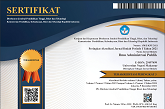Analysis of Readiness to Apply Etle (Electronic Traffic Law Enforcement) Traffic Unit of Wajo Police in Wajo Regency
(1) Public Administration, Universitas Puangrimaggalatung, Sengkang, South Sulawesi
(2) Public Administration, Universitas Puangrimaggalatung, Sengkang, South Sulawesi
(3) Public Administration, Universitas Puangrimaggalatung, Sengkang, South Sulawesi
(*) Corresponding Author
DOI: https://doi.org/10.26858/jiap.v12i1.34818
Abstract
With the inauguration of ETLE, it is expected to minimize extortion by officers and improve driving discipline. This study aims to determine and analyze the readiness of the Wajo Police Traffic Unit and describe the supporting and inhibiting factors in the implementation of ETLE (Electronic Traffic Law Enforcement) by the Wajo Police Traffic Unit in Wajo District. This type of research is a qualitative method with a descriptive approach using data collection techniques through observation, in-depth interviews and documentation. The results showed that (i) the readiness of the Wajo Police Traffic Unit in the Implementation of ETLE (Electronic Traffic Law Enforcement) in Wajo Regency was analyzed using the theory of readiness indicators or e-readiness according to Richardus Eko Indrajit (2015: 39), namely: (a) Infrastructure Telecommunication has been carefully planned by the Wajo Regency Government and Wajo Police in accordance with the standards imposed by the National Police (b) The level of connectivity and use of ICT is good enough (c) The capacity of the Wajo Police Traffic Unit is sufficient to control the use of ETLE in Wajo Regency ; (d) the availability of funds and budget for the development of telecommunications infrastructure for the implementation of ETLE in Wajo Regency is still waiting for regulations from the regional government and the National Police; (e) The legal instruments for the implementation of ETLE in Wajo Regency are Law Number 22 of 2009 and Government Regulation Number 80 of 2012; (f) Police is not law is a new paradigm (ii) Supporting and inhibiting factors for the implementation of ETLE (Electronic Traffic Law Enforcement) by the Traffic Unit of the Wajo Police in Wajo Regency (a) Supporting factors include human resources of the Wajo Police Traffic Unit, legal instruments; (b) Inhibiting factors include, among others, facilities and infrastructure, funds/budget, and data on road users' vehicles .
Keywords
Full Text:
PDFReferences
Aboelmaged, M. G. (2014). Predicting e-readiness at firm-level: An analysis of technological, organizational and environmental (TOE) effects on e-maintenance readiness in manufacturing firms. International Journal of Information Management, 34(5), 639–651.
Alonso, F., Esteban, C., Montoro, L., & Useche, S. A. (2017). Knowledge, perceived effectiveness and qualification of traffic rules, police supervision, sanctions and justice. Cogent Social Sciences, 3(1), 1393855.
Apeanti, W. O. (2016). Contributing Factors to Pre-Service Mathematics Teachers’e-Readiness for ICT Integration. International Journal of Research in Education and Science, 2(1), 223–238.
Bayles, M. E. (2012). Principles of law: A normative analysis (Vol. 5). Springer Science & Business Media.
Hsiao, H., Chang, J., & Simeonov, P. (2018). Preventing emergency vehicle crashes: status and challenges of human factors issues. Human Factors, 60(7), 1048–1072.
Joewono, T. B., & Susilo, Y. O. (2017). Traffic violations by young motorcyclists on Indonesian urban roads. Journal of Transportation Safety & Security, 9(sup1), 236–261.
Kashorda, M., & Waema, T. M. (2011). ICT indicators in higher education: Towards an e-readiness assessment model.
Nurdin, B. (2011). Gender Discrimination of Woman in Arab in “In The Land of Invisible Women” Novel by Qanta A. Ahmed (Feminist Approach). Universitas Islam Negeri Alauddin Makassar.
Organization, W. H. (2015). Global status report on road safety 2015. World Health Organization.
Papilaya, J., Soisa, T. R., & Akib, H. (2015). The influence of implementing the strategic policy in creating business climate, business environment and providing support facilities towards business empowerment on small medium craft enterprises in Ambon Indonesia. International Review of Management and Marketing, 5(2).
Plankermann, K. (2014). Human factors as causes for road traffic accidents in the Sultanate of Oman under consideration of road construction designs.
Prasetyono, L. P. (2022). The Problem of Diversion in Children Perpetrators of Traffic Violations in Indonesia. Jambura Law Review, 4(1), 38–51.
Ramenzoni, V. C. (2021). Co-governance, Transregional Maritime Conventions, and Indigenous Customary Practices Among Subsistence Fishermen in Ende, Indonesia. Frontiers in Marine Science, 1011.
Restuputri, D. P., Febriansyah, A. M., & Masudin, I. (2022). Risk Behavior Analysis in Indonesian Logistic Train Level Crossing. Logistics, 6(2), 30.
Rezai-Rad, M., Vaezi, R., & Nattagh, F. (2012). E-health readiness assessment framework in Iran. Iranian Journal of Public Health, 41(10), 43.
Ross, H. L. (2017). Settled out of court: The social process of insurance claims adjustment. Routledge.
Sa’diyah, N. K., & Enggarsasi, U. (2018). Strategy of Improvement Effort in Traffic Accidents.
Siagian, T. H., Purhadi, P., Suhartono, S., & Ritonga, H. (2014). Social vulnerability to natural hazards in Indonesia: driving factors and policy implications. Natural Hazards, 70(2), 1603–1617.
Šucha, M. (2014). Road users’ strategies and communication: driver-pedestrian interaction. Transport Research Arena (TRA), 1.
Susilo, Y. O., Joewono, T. B., & Vandebona, U. (2015). Reasons underlying behaviour of motorcyclists disregarding traffic regulations in urban areas of Indonesia. Accident Analysis & Prevention, 75, 272–284.
Tampubolon, B. M. (2021). Ignoring safety aspects that could reduce traffic accidents. KnE Social Sciences, 363–374.
Tyler, T. R. (2021). Why people obey the law. In Why People Obey the Law. Princeton university press.
Windari, R., & Novianto, W. T. (2021). Child protection versus teacher protection: a legal review of the settlement of school corporal punishment in Indonesia. Crime, Law and Social Change, 76(1), 1–22.
Yanto, O., & Iqbal, M. (2020). Protection Of Teacher Profession Encountered With The Rule Of Criminal Law On Child Protection. Tadulako Law Review, 4(2), 183–201.
Yuliantoro, Y., & Sulchan, A. (2021). The Effectiveness against Traffic Violations with Electronic Traffic Law Enforcement (ETLE). Law Development Journal, 3(4), 736–742.
Article Metrics
Abstract view : 269 times | PDF view : 74 timesRefbacks
- There are currently no refbacks.
Copyright (c) 2022 Sitti Aminah, Syamsiar Syamsiar, Fajri Fajri

This work is licensed under a Creative Commons Attribution 4.0 International License.
Diterbitkan oleh:
Program Studi Ilmu Administrasi Publik
Program Pascasarjana Universitas Negeri Makassar
JIAP Index By:

This work is licensed under a Creative Commons Attribution 4.0 International License.









